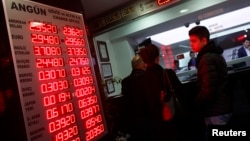The Turkish lira hit record lows this week, following Sunday's police raids on media establishments and an ensuing diplomatic row over the action between Turkey and the European Union.
After begin rebuked by the EU for the police raids and arrests of journalists, Turkish President Recep Tayyip Erdogan launched a verbal salvo earlier this week against the EU, telling it to mind its own business and warning that Ankara was ready to walk away from its 40-year quest for membership.
The financial markets' response was negative, with the lira plummeting to a record low, trading at 2.33 lira to the dollar earlier this week.
Financial markets are nervous over economic turmoil in Russia and observers warn that the sentiment could spread to Turkey.
Investors wary
Consultant Atilla Yesilada of Global Source partners, said, in the past, financial markets were largely immune to belligerent comments by the Turkish president, but this week’s reaction could be a signal that their attitude toward Erdogan has changed.
"He challenged EU, which I think increasingly led many investors to believe Turkey is following the path of Mr. Putin,” Yesilada said.
“This is the first time we have seen investors react so poorly to policy statements. And I am afraid evidence has accumulated to the point, for good or bad, that Mr. Erdogan or Ankara’s policy decisions are completely unpredictable,” Yesilada said.
Erdogan's anti-West rhetoric plays well with his core pious, nationalist voting base, a key consideration ahead of general election next year.
He is looking to the ruling AK Party to secure a two-thirds parliamentary majority that would allow him to achieve his goal of turning the country into a presidential system.
But Erdogan has a problem: The economy's growth is down to less than 3 percent, far below the average of 8 percent the previous decade. But what may be more worrying is that unemployment is rising, currently at a three-year high.
Political scientist Cengiz Aktar of Istanbul’s Suleyman Sah University said the president sees interest rates as the key to achieving his political goals.
Erdogan "thinks that the economic activity will be cheered up with a falling interest rate, because for the government supporters, they have been benefiting from new goodies that this government is offering to them, the consumption spree and that they are happy with it, they are consuming. They do not care [what] the government and ruling party is doing,” Aktar said.
Since the central bank doubled interest rates in January to stave off a currency collapse, Erdogan has been putting Central Bank chief Erdem Basci under intense pressure to decrease them.
Markets becoming unforgiving
But the latest falls in the Turkish lira, along with signs that financial markets are becoming increasingly unforgiving toward Turkey, make any move on interest rates a high-reward and high-risk strategy, consultant Yesilada said.
"Exporters obviously gain, manufacturing immediately starts to increase employment. And the construction immediately starts, gaining employment. So essentially they are trading off higher exports and faster construction activity against devastating increase in inflation and potentially bankruptcies” in some sectors with a high concentration in foreign exchange loans, Yesilada said.
This week, rating agency Fitch warned that next year will pose a tougher operating environment for Turkish banks, highlighting the likelihood of the deteriorating loan portfolios, with increased consumer indebtedness and the risk of currency drops.
The warning is the latest by rating agencies and likely to further restrict the government’s economic room to maneuver.
Analysts said political factors could also add to economic concerns, with an election looming and an increasingly unpredictable political leadership and unforgiving international financial markets.




